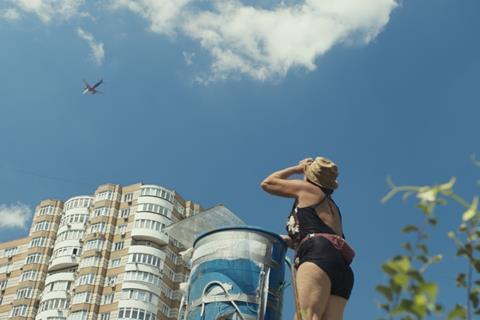A Kyiv woman fights to maintain her city garden under the shadow of war in this life-affirming documentary

Dir: Adelina Borets. Poland/Ukraine. 2024. 70mins
Amid all the horror and loss of war, Adelina Borets finds a green shoot of hope in Flowers Of Ukraine. Her first feature celebrates Kyiv resident Natalia, whose cheerful ongoing fight against property developers is dwarfed by the struggle faced by Ukraine when Russia invades in 2022. The modest running time, engaging central figure and fresh perspective on recent events should ensure that festival invitations bloom following screenings at Krakow and DOK Leipzig.
Natalia’s life comes to represent the life of Ukraine
Flowers Of Ukraine begins in Kiev, 2021, with an appealing vision of Natalia’s little piece of heaven on earth. Surrounded by towering tenement blocks and situated next to a car park, Natalia presides over a leafy green patch that feels like a stretch of countryside in the heart of the city. Chickens and goats roam freely, there are freshly-laid eggs to gather, tomatoes to pick and cucumbers to pickle. It is an idyllic vision of the good life where the biggest danger comes from the goats who choose to jump on the nearby parked cars.
The summer sun’s warmth, the quiet hiss of sprinklers and shots of red roses, heavily laden raspberry bushes and ripening watermelons all contribute to a sense of a paradise that we know is about to become endangered. Before that, we gain a better understanding of Natalia, a woman of warm good humour and resilience. There is something in her look and spirit that is reminiscent of Agnes Varda. Surrounded by her family, including two ex-husbands, Natalia has an appetite for life on her terms and isn’t about to sacrifice her hard-won freedom or independence.
Borets builds a sense of Natalia as someone emblematic of Ukraine. Brief glimpses of archive footage offer a reminder of Ukraine’s Declaration of Independence from Soviet rule in 1991. In her late 60s, Natalia is old enough to remember school lessons that were taught in Russian. She carries a sunny certainty about battles fought, victories achieved and issues resolved. Things start to change when Natalia and her family receive an eviction notice and a visit from Genadiy, a smooth-talking representative of a development company whch literally wants to pave her paradise and put up a parking lot.
You assume Borets was initially attracted to Natalia’s David vs. Goliath story as a great tale of an individual staunchly resisting the blandishments of big business. Then, Putin’s invasion is unleashed. Martial law is imposed, shelters are built and bombs start to fall. Circumstances change but, significantly, Natalia doesn’t, and Borets’ film becomes a testimony to her resilience as she constructs her own bomb shelter, offers her services to a territorial defence league, makes Molotov cocktails and decides to stay put. “I am not running away,” she announces. “I have nowhere to run.”
Cinematographers Bohdan Rozumnyi and Bohdan Borysenko ground the film in the changing seasons with shots of snowy winter funerals, roses rotting in the autumn rain and marigold seeds being planted for another year. Natalia’s life comes to represent the life of Ukraine and the sense of community that is all important in the country’s refusal to submit. A variety of compositions by Ukrainian folk music quartet DakhaBrakha are effectively woven through the film, underlining the emotional tug of solidarity.
There is death and sacrifice in this story, but Borets mostly shies away from the grim realities of an ever lengthening war. Instead, she chooses to emphasise hope in a surprisingly life-affirming documentary, endorsing the belief that everything will be fine as long as the flowers keep blooming.
Production companies: Gogol Film, Koskino, DI Factory
International sales: Gogol Film film@gogol.foundation
Producers: Glib Lukianets, Natalia Grzegorzek
Screenplay: Adelina Borets, Glib Lukianets, Marta Molfar
Cinematography: Bohdan Rozumnyi, Bohdan Borysenko
Editing: Agata Cierniak, Mateusz Wojtynski
Music: DakhaBrakha
























